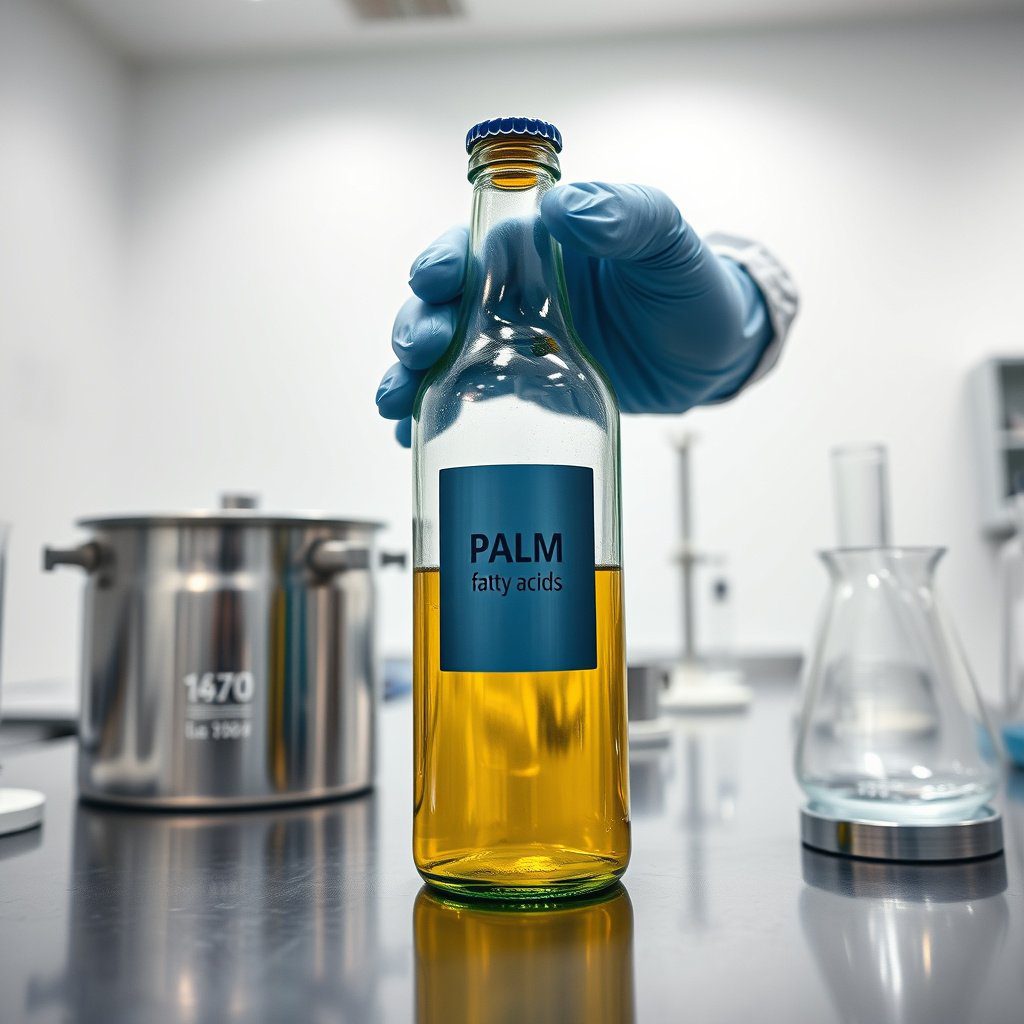In the palm oil industry, fatty acids are a cornerstone for formulating sustainable, safe, and compliant products across food, feed, and oleochemicals.
Certifications provide the framework that separates trusted suppliers from markets flooded with variability, adulteration risks, and regulatory headaches.
This guide explains essential standards, verification methods, and decision criteria for organizations seeking a palm fatty acid supplier with global reach.
With two decades of market experience, Diplomata Comercial translates complex standards into practical supply chain practices that protect brand integrity.
We help industrial buyers in HPPC, pharma, food ingredients, and animal nutrition navigate certifications, testing, and documentation for consistent quality.
From raw material sourcing to final distribution, our approach emphasizes traceability, risk management, and transparent communication with customers.
The result is reliable supply, reduced audit findings, and a partner who understands regional regulatory nuances across LATAM, North America, and Europe.
This article uses real-world scenarios and practical steps to help you assess certifications, audit readiness, and supplier capabilities.
Essential Certification Standards for Palm Oil Fatty Acids
Global standards ensure that palm oil fatty acids meet safety, quality, and environmental expectations across markets.
In practice, a quality management system, rigorous product testing, and auditable documentation are non‑negotiable components of a compliant supply chain.
Global Certification Frameworks You Must Align With
Several frameworks form the backbone of credible PFAD supply.
The key is alignment across production, testing, and governance to minimize risk and maximize performance.
- GMP (Good Manufacturing Practice) and GMP-related certifications ensure consistent process control from input to final product.
- ISO 9001 (Quality Management) provides a framework for continuous improvement and customer confidence.
- ISO 14001 (Environmental Management) demonstrates commitment to sustainable production and waste reduction.
- HACCP (Hazard Analysis and Critical Control Points) addresses biological, chemical, and physical safety across the supply chain.
- FAMI-QS (Feed Specialized Quality) and GMP+ (for feed ingredients) are critical when PFAD is used in animal nutrition and related applications.
- Halal and Kosher certifications can be relevant depending on end-use markets and consumer expectations.
- CoA-driven programs (Certificate of Analysis) and formal COA verification systems ensure product specifications travel with every shipment.
In practice, aligning with these standards translates into auditable records, clear batch traceability, and consistent product quality across suppliers and geographies.
Diving into Product-Specific Certifications for PFAD
Palmitic and oleic ratios, iodine value, moisture content, and oxidation measures define the technical acceptance criteria for PFAD.
The right certifications provide assurance that these metrics stay within defined ranges under varying storage and transport conditions.
- Certificate of Analysis (COA) for each batch, detailing acidity, peroxide value, iodine value, moisture, unsaponifiable matter, and color.
- Certificate of Conformity or compliance statements aligned with customer specifications and regional regulations.
- Batch release documentation and lot traceability records linking input materials to finished PFAD.
- Quality management system accreditation (e.g., ISO 9001) to demonstrate ongoing process control.
Operationally, this means consistent product quality and reliable supply planning for customers who rely on PFAD as a critical ingredient.
Traceability and Sustainability Certifications That Differentiate a Palm Fatty Acid Supplier
Traceability isn’t merely a requirement; it’s a competitive differentiator.
Digital recordkeeping, transparent supplier audits, and credible sustainability credentials build trust with customers who demand accountability from every link in the chain.
Sustainability Schemes: RSPO, ISCC PLUS, and Beyond
Two prominent frameworks drive credibility in palm oil sourcing.
RSPO (Roundtable on Sustainable Palm Oil) and ISCC PLUS are widely recognized by manufacturers and retailers who prioritize responsible sourcing and sustainability credentials.
RSPO focuses on sustainable cultivation, responsible processing, and socially equitable practices, while ISCC PLUS emphasizes life cycle assessment, greenhouse gas accounting, and comprehensive chain-of-custody documentation.
Aligning with these schemes helps a PFAD supplier demonstrate environmental stewardship and social responsibility.
Beyond RSPO and ISCC PLUS, many buyers require certifications for supply chain transparency, including credible supplier audits, third-party verification, and measurable improvements in land-use practices.
For a palm fatty acid supplier, integrating these credentials strengthens market access and reduces supply-chain disruption risks.
From a practical perspective, the goal is to present a clear, auditable lineage for PFAD—from cultivation and processing to shipping and end-use application—supported by digital traceability tools and third-party attestations.
Digital Traceability and Transparent Supply Chains
Digital traceability systems, such as ERP-integrated product lineage and blockchain-enabled records, provide end-to-end visibility.
For buyers, this translates into faster audits, fewer delays, and greater confidence in supplier integrity.
In real terms, a palm fatty acid supplier can offer customers a live, auditable trail showing each batch’s origin, processing steps, and test results.
This visibility reduces compliance risk and accelerates regulatory review in import markets.
Quality Assurance in Palm Fatty Acids: Test Methods and Documentation
Quality assurance for PFAD hinges on robust analytical testing, strict sampling plans, and clear documentation.
Practical QA practices enable predictable performance and support rapid decision-making during procurement and production.
Key Analytical Parameters and Acceptance Criteria
Analytical testing defines product acceptance.
Consistent methodologies and reference standards ensure comparability across suppliers and shipments.
- Acid value: Indicates free fatty acids; elevated values can signal degradation or improper processing.
- Peroxide value: Assesses primary oxidation products; low values reflect fresher material and better stability.
- Iodine value (IV): Measures unsaturation; confirms formulation compatibility and downstream processing behavior.
- Moisture content: Excess moisture can promote hydrolysis and microbial concerns during storage.
- Unsaponifiable matter: Reflects impurities that may affect performance and color stability.
- Color and appearance: Visual assessment ties to process control and batch uniformity.
- Heavy metals and contaminants (where applicable): Ensures consumer and industrial safety compliance.
Each PFAD supplier should provide a detailed COA (Certificate of Analysis) for every batch, supported by independent laboratory results where possible.
This practice reinforces a quality-centric culture and regulatory readiness.
Sampling, QA Documentation, and Audit Readiness
Sampling plans must be statistically robust to capture batch variability and ensure representative results.
Documentation should be ready for internal QA reviews and external audits.
- Approved sampling plan that defines sample size, frequency, and handling procedures.
- Chain-of-custody records that link every sample to the original batch and lab results.
- Standard operating procedures (SOPs) for testing, equipment calibration, and data integrity.
- Periodic proficiency testing and third-party verification to maintain measurement accuracy.
For an organization evaluating a potential palm fatty acid supplier, clear QA documentation reduces audit findings, speeds qualification, and supports ongoing quality improvements.
Regulatory and Global Trade Compliance: Documentation and Labeling
Global trade imposes multidimensional compliance requirements.
A well-prepared supplier provides complete documentation, accurate labeling, and proactive regulatory engagement to minimize delays and penalties.
Documentation, Labeling, and Product Safety
Documentation should cover material safety data sheets (MSDS), composition declarations, and product use restrictions.
Accurate labeling ensures end users understand content, hazard classifications, and application guidance.
Where PFAD is used in food, feed, or cosmetics, labeling and compliance become even more critical.
Aligning with customer-specific labeling requirements and regional regulations helps avoid product hold-ups at import checkpoints.
REACH, FDA, and Regional Requirements
Regulatory frameworks vary by region.
For PFAD, some buyers may require compliance with REACH in the European Union, FDA considerations in the United States, or country-specific registrations in Asia and the Americas.
Proactive compliance supports market access and reduces the risk of supply interruptions.
A responsible palm fatty acid supplier maintains up-to-date regulatory intelligence and engages in early dialogue with customers about upcoming changes.
In practice, robust regulatory readiness translates into fewer last-minute amendments, smoother audits, and a higher likelihood of on-time production planning.
Choosing a Palm Fatty Acid Supplier: 7 Practical Evaluation Criteria
Selecting the right partner is critical for stability, cost control, and long-term growth.
Use these criteria to structure supplier conversations and due diligence.
7 Evaluation Criteria You Can Apply Today
- Certification Portfolio: Does the supplier hold GMP, ISO 9001, ISO 14001, HACCP, FAMI-QS, and relevant sustainability credentials?
- Traceability Capabilities: Is batch-level traceability implemented with digital records and clear chain-of-custody?
- Sustainability Credentials: Are RSPO, ISCC PLUS, or equivalent programs in place or achievable within a defined timeline?
- Analytical Rigor: Can the supplier provide COAs with standardized test methods and Third-party verification?
- Supply Continuity: Does the supplier offer diversified sourcing, contingency plans, and scalable logistics to meet demand volatility?
- Quality Control Culture: Are there proactive QA processes, root-cause analysis, and continuous improvement programs?
- Regulatory Readiness: How well does the supplier anticipate regulatory shifts and communicate changes that affect customers?
For organizations seeking a reliable palm fatty acid supplier, these criteria help build confidence in a partner who can support both near-term needs and strategic ambitions.
Implementation Roadmap to Certification Readiness
Transitioning to a certified, compliant PFAD supply requires a practical, phased plan.
A structured roadmap accelerates readiness and reduces downtime in sourcing initiatives.
Phase 1: Gap Analysis and Baseline Assessment
Begin with a comprehensive gap analysis comparing current practices against target standards.
Identify the most impactful gaps and quantify the remediation effort required.
Key activities include documenting existing certifications, reviewing COAs, and mapping suppliers to RSPO or ISCC PLUS expectations where relevant.
From this phase, establish a prioritized action plan with measurable milestones and ownership assignments.
Phase 2: Documentation Alignment and Process Control
Standardize SOPs, update QA/QC procedures, and align test methodologies.
Ensure COA templates are uniform, auditable, and aligned with customer requirements.
Implement digital traceability tools to link raw materials, processing steps, and finished PFAD.
This discipline reduces rework during audits and improves overall reliability.
Phase 3: Audit Readiness and Supplier Development
Prepare for internal audits and third-party assessments by conducting mock audits, training teams, and closing non-conformities promptly.
Build a supplier development plan to address any gaps identified in supplier audits.
Engage with customers early to align on audit scopes, documentation expectations, and certification timelines.
Proactive communication accelerates trust and collaboration.
Phase 4: Certification Maintenance and Continuous Improvement
Establish a cadence for management reviews, periodic re-certifications, and routine supplier performance evaluations.
Emphasize continuous improvement in QA metrics, delivery reliability, and sustainability performance.
Leverage lessons learned from audits to refine processes, reduce variability, and strengthen competitive differentiation in the market.
Next Strategic Steps to Partner with a Palm Fatty Acid Supplier
Choosing the right partner is a strategic decision that affects product quality, compliance, and business growth.
The right palm fatty acid supplier offers a combination of robust certification coverage, transparent traceability, and a track record of reliable performance across regions.
Diplomata Comercial brings over 20 years of market experience to this critical task.
We translate complex standards into practical supply chain actions that protect your brand, ensure regulatory alignment, and enable scalable growth.
If you’re seeking a provider that combines global reach, reliable delivery, and technical expertise in PFAD, we invite you to explore collaboration opportunities.
To begin a conversation about your certification strategy, testing requirements, and supplier qualification plan, contact our team.
We can tailor a step-by-step program that aligns with your product portfolio, regulatory landscape, and market ambitions.
For a dependable palm fatty acid supplier, your next best move is a partner who can deliver certainty in every shipment and clarity in every decision.
Ready to advance? Schedule a strategic consultation to review your current certifications, discuss gaps, and outline a practical path to compliance, traceability, and ongoing improvement.
Your supply chain deserves a partner that combines certainty with performance—and Diplomata Comercial stands ready to lead.
Frequently Asked Questions
What is PFAD and why certifications matter when evaluating a palm fatty acid supplier?
PFAD stands for palm fatty acid distillate, a byproduct of crude palm oil refining used in food, feed, and oleochemicals. Certifications demonstrate safety, quality, and environmental stewardship, helping you distinguish a reputable palm fatty acid supplier from markets with variability or risk. They also simplify regulatory compliance and audit readiness.
How do GMP and ISO 9001 relate to quality in a palm fatty acid supplier?
GMP ensures consistent process control from input to finished product, reducing variability in a palm fatty acid supplier’s outputs. ISO 9001 provides a structured quality management framework focused on continuous improvement and customer satisfaction, aligning supplier performance with expectations across batches. Together, they anchor reliable supply and traceability.
What testing and documentation should I require from a palm oil fatty acids supplier?
Require third-party laboratory testing and a current certificate of analysis for every batch, plus complete product specifications and supplier declarations. Robust traceability records, including lot numbers and origin, enable quick verification and recalls if needed.
How can I assess a palm fatty acid supplier’s audit readiness for LATAM, North America, and Europe?
Review recent audit reports, corrective action plans, and evidence of ongoing compliance across regions. Verify that testing methods, management systems, and governance align with regional regulations and customer expectations, and look for clear contact points for region-specific support.
Why is traceability critical when selecting a palm fatty acid supplier?
Traceability lets you map material from feedstock through processing to final product, enabling rapid issue investigation and recall readiness. It also reduces audit findings by providing auditable records that demonstrate responsible sourcing and compliance.
Which global frameworks should I prioritize when vetting a palm oil fatty acids supplier?
Prioritize GMP, ISO 9001, and food-safety schemes such as HACCP or ISO 22000; these ensure process control, quality management, and risk mitigation. For sustainability and responsible sourcing, look for RSPO certifications or equivalent palm oil standards.
How do certifications translate into practical supply chain benefits for a palm fatty acid supplier?
Certifications create trust with customers by ensuring consistent product quality, transparency, and auditable records. They typically reduce audit findings, facilitate regulatory approvals, and support reliable, on-time delivery.
What questions should I ask a palm fatty acid supplier during due diligence to ensure compliance?
Ask for current COAs, recent audit reports, and corrective action status; request evidence of regional regulatory knowledge and a documented traceability system. Inquire about third-party lab partners, recalls history, and the supplier’s capabilities to support your specific markets (LATAM, NA, Europe).





